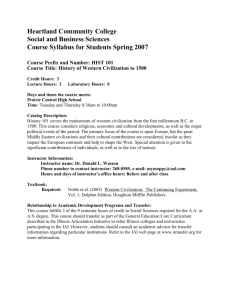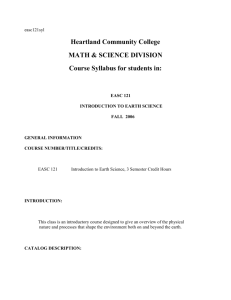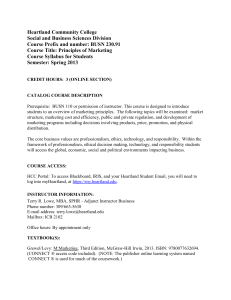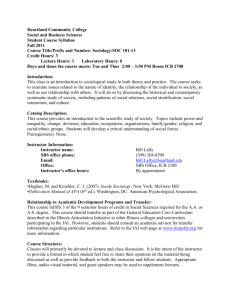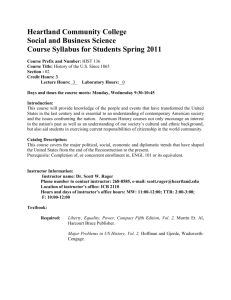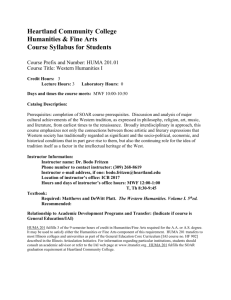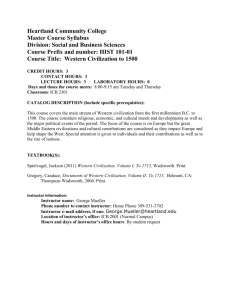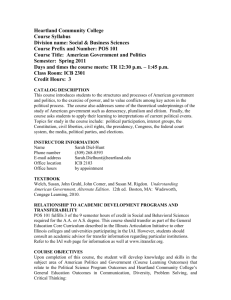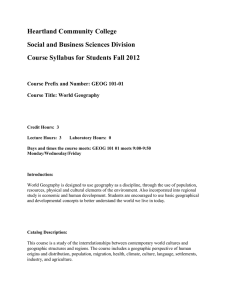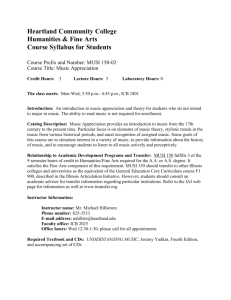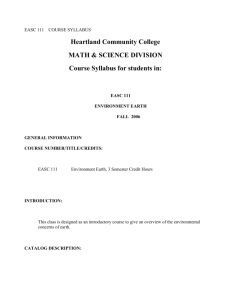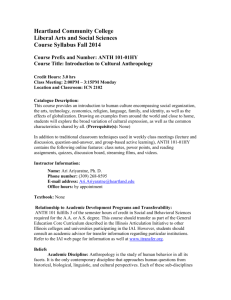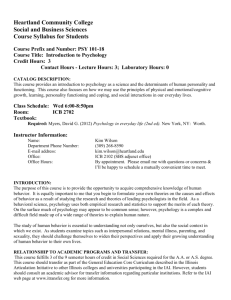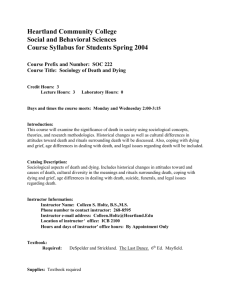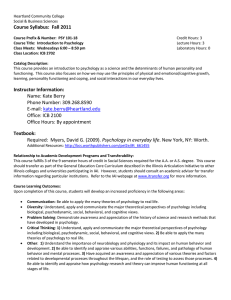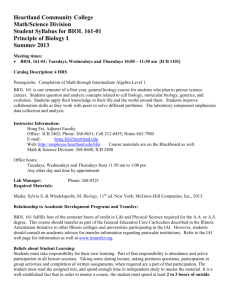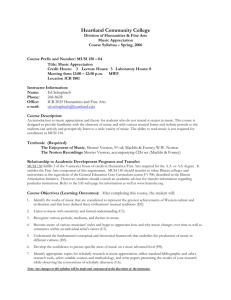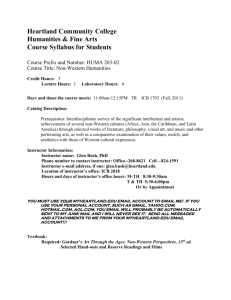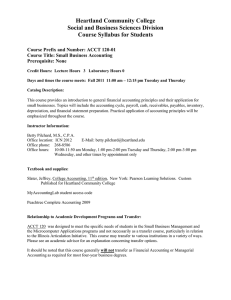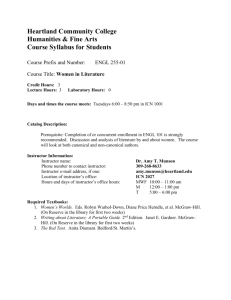HIST 101 CAL Wasson SP 12
advertisement
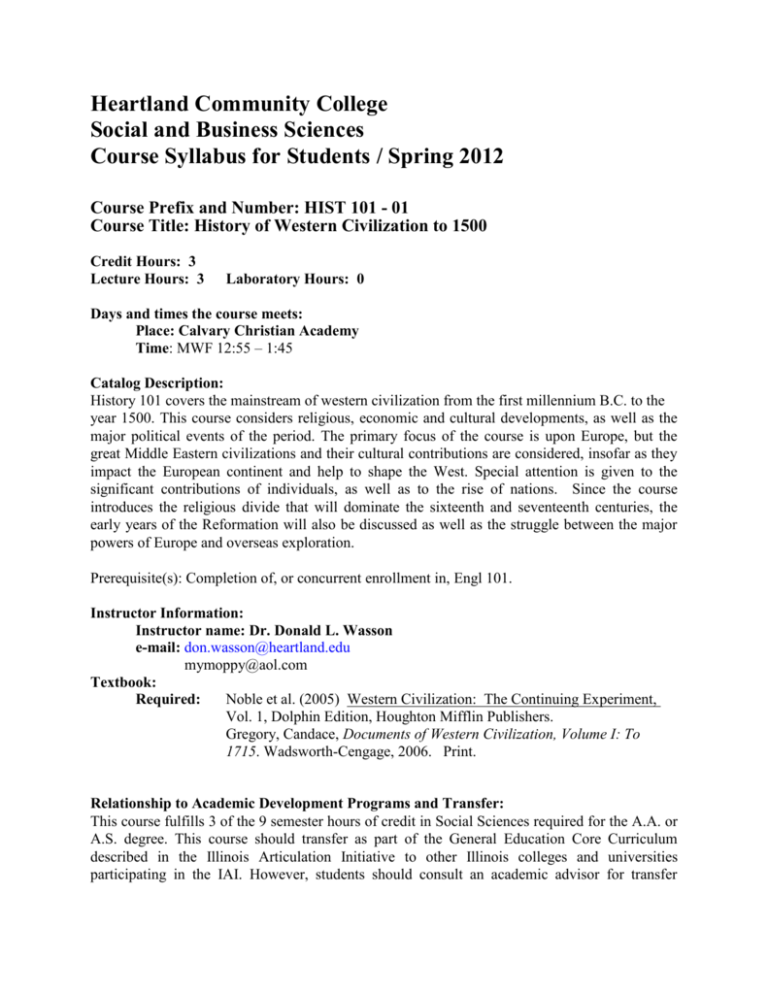
Heartland Community College Social and Business Sciences Course Syllabus for Students / Spring 2012 Course Prefix and Number: HIST 101 - 01 Course Title: History of Western Civilization to 1500 Credit Hours: 3 Lecture Hours: 3 Laboratory Hours: 0 Days and times the course meets: Place: Calvary Christian Academy Time: MWF 12:55 – 1:45 Catalog Description: History 101 covers the mainstream of western civilization from the first millennium B.C. to the year 1500. This course considers religious, economic and cultural developments, as well as the major political events of the period. The primary focus of the course is upon Europe, but the great Middle Eastern civilizations and their cultural contributions are considered, insofar as they impact the European continent and help to shape the West. Special attention is given to the significant contributions of individuals, as well as to the rise of nations. Since the course introduces the religious divide that will dominate the sixteenth and seventeenth centuries, the early years of the Reformation will also be discussed as well as the struggle between the major powers of Europe and overseas exploration. Prerequisite(s): Completion of, or concurrent enrollment in, Engl 101. Instructor Information: Instructor name: Dr. Donald L. Wasson e-mail: don.wasson@heartland.edu mymoppy@aol.com Textbook: Required: Noble et al. (2005) Western Civilization: The Continuing Experiment, Vol. 1, Dolphin Edition, Houghton Mifflin Publishers. Gregory, Candace, Documents of Western Civilization, Volume I: To 1715. Wadsworth-Cengage, 2006. Print. Relationship to Academic Development Programs and Transfer: This course fulfills 3 of the 9 semester hours of credit in Social Sciences required for the A.A. or A.S. degree. This course should transfer as part of the General Education Core Curriculum described in the Illinois Articulation Initiative to other Illinois colleges and universities participating in the IAI. However, students should consult an academic advisor for transfer information regarding particular institutions. Refer to the IAI web page at www.itransfer.org for more information. Academic Discipline: History is one of the few disciplines outside of mathematics and the sciences with more than a century or two of established academic worth. The study of history is essential to any understanding of the complexity of human society and human aspirations. The process of learning of the inter-relationship of politics, economics, religion, art, technology and culture increases the learner’s ability to comprehend the subtle and or not so subtle ways in which our present has been shaped by current events. Student Learning: As with anything in life, you will get as much from the study of history as you are willing to put into it. Learning is what you do. No one can do it for you. You must read and think and write about the past and present. You must try always to do it because only with effort and an opened mind you will take away pride in your endeavor and knowledge that will always be yours. Instructor’s Role: I will be here to instruct you about the past, the present and your place in it. You will hear lectures, told stories and be asked to respond to events. I will encourage you, offer assistance and, of course, evaluate your performance. I will be available to discuss history, to answer your questions, or to point you in the direction of sources for you to use to find answers. Course Objectives (Learning Outcomes): Outcomes General Education Range of Assessment Outcomes Methods Distinguish between primary and secondary sources as the foundation of modern historical scholarship from the first millennium B.C. to 1500. PS1 exams, quizzes, research paper, group project, other methods Interpret primary sources critically by analyzing their historical contexts. CT3 exams, quizzes, research paper, group project, other methods Formulate historical interpretations, both CO4 in discussion and in writing, and defend them critically with reference to primary and secondary sources. exams, quizzes, research paper, group project, oral report, other methods Incorporate into historical interpretations, CT3 both in discussion and in writing, an understanding of historical causation reflecting a) knowledge of important figures and events and their chronological relationship to each other and b) an awareness of the contingent relationships. Acquire at one and the same time a DI3 comprehension of diverse cultures and shared humanity, as evidenced both orally and in writing. exams, quizzes, research paper, group project, oral report, other methods exams, quizzes, research paper, group project, oral report, other methods Course/Lab Outline: Topic Outline for the Course: The Civilization of the Ancient Near East Hellenic Civilization The Roman World The Byzantine Recovery and the Challenge of Islam Charlemagne and the Carolingian Empire The High Middle Ages The Crusades The Late Middle Ages The Renaissance Course Policies: Method of Evaluation 1 midterm exam (100 points) – take-home essay component – 2-3 pages 1 final exam (100 points) – take-home essay component – 2-3 pages 2 quizzes (100 points each) – essay component – 1-2 pages each 1 biography paper (100 points) – 5-7 pages 1 research paper (100 points) – 5-7 pages 4 Reading Assignments (25 points each/100 points) – 1-2 page response/analysis each Class participation and attendance Attendance/Evaluation: Students are expected to attend all classes and participate meaningfully in the activities of each class session. Attendance will be taken at every class meeting. Incompletes: An incomplete may be given at the instructor’s discretion, if the student, by the withdrawal date, can reasonably be expected to pass the course. Incompletes may be granted only when justified by extreme circumstances (e.g., serious illness, accident, death or serious illness in the immediate family) See College Catalog for further information. Extra-Credit: No extra credit is anticipated for this class. Make-up of Tests and Assignments: All make-ups are granted at the discretion of the instructor and will be determined according to the individual merits of the case. Required Reading and Writing: This course requires approximately 30-40 pages of reading per session or 500 per semester. A minimum of 15 pages of college level writing is required in this course. Writing assignments include two research papers, essays on exams, and other projects as deemed appropriate by the instructor. Specifications for written materials: Written materials will be formatted exactly as they are in English classes, ie standard MLA format. General Information for Students Testing Services (located in Student Commons Building 2001) Testing Services provides a secure testing environment for students who are enrolled in online, hybrid, and other distance learning courses; have a documented disability; or need to take a make-up exam. Testing accommodations for students having documented disabilities must be arranged by the student through Disability Support Services, and Testing Services will only administer make-up exams at the request of the instructor. For more information, please call (309) 268-8050. Services in Academic Support Center (Raab Road campus) Library The Library provides fast and free access to credible information from a full range of resources including books, online journals, videos, newspapers, online music, class reserves, and interlibrary loan. Individualize research by appointment or come in anytime. See the Library tab in myHeartland, email library@heartland.edu or call (309) 268-8292 for details. Tutoring Services Tutoring Services provides tutoring in various forms at no cost to Heartland students in Normal, Pontiac, and Lincoln. Tutors are available at convenient times throughout the week. Study groups are also available by request. For more information about services available at each location, please call (309) 268-8231 (Normal), (815) 842-6777 (Pontiac), or (217) 735-1731 (Lincoln). Disability Support Services Disability Support Services (DSS) ensures that students with disabilities have equal access to the college’s programs, services and activities through the provision of reasonable accommodations as mandated in Section 504 of the Rehabilitation Act and the Americans with Disabilities Act. DSS offers a wide range of services to support students with disabilities, including: assistive technology, document conversion services, personnel, classroom and testing accommodations. Students with a documented disability who wish to discuss academic accommodations should call (309) 268-8259 for details. Open Computing Lab The Open Computing Lab provides free computing for HCC students at convenient times throughout the week. The computer lab is staffed by trained Lab Assistants and offers the use of approximately 70 computers, a scanner, a laser printer, and an electric typewriter. Writing Services Writing Services provides guidance for writers on assignment comprehension, critical thinking and the stages of the writing process. Writing Services is staffed by English faculty with years of experience in the teaching of writing. In every session, faculty work with writers to explore and develop their own ideas as appropriate to the needs of their readers and to learn the rhetorical strategies necessary for effective communication. For more information, please call (309) 268-8231. Services in Community Commons Building, first floor (Raab Road campus) Academic Advising Academic advisors provide information to students about degree/program requirements, transferability of courses, GPA, and enrollment. Academic Advising may also provide workshops on time management, IRIS navigation, or specific career fields. For more information, please call (309) 268-8033. Career Services Career Services offers guidance and resources to assist students determine their career goals, develop employability and job search skills, and connect with potential employers. In addition, two experiential learning programs, job shadowing and internships, provide students with relevant work-based learning opportunities. Job shadowing assists students in clarifying their career goals. Internships help students “bridge the gap” between the academic environment and employment in their chosen career fields. For more information, please call Career Services at (309) 268-8034. Counseling Services The personal development counselor provides confidential and professional counseling for both emergency and personal issues. Services also include referrals to local community resources. For more information, please call (309) 268-8033. Financial Aid Office The Financial Aid Office provides information on programs and types of financial aid available to students. For more information, please call (309) 268-8020. Transcripts Official and unofficial transcripts may be obtained at the Student Records desk. Transcripts may also be obtained at Heartland’s Lincoln and Pontiac sites. Transcripts must be requested in writing. The form is available online (http://www.heartland.edu/transcripts/index.jsp) or at the Student Records desk. . Academic Integrity Academic integrity is a fundamental principle of collegial life at Heartland Community College and is essential to the credibility of the College’s educational programs. Moreover, because grading may be competitive, students who misrepresent their academic work violate the right of their fellow students. The College, therefore, views any act of academic dishonest as a serious offense requiring disciplinary measures, including course failure, suspension, and even expulsion from the College. In addition, an act of academic dishonesty may have unforeseen effects far beyond any officially imposed penalties. Violations of academic integrity include, but are not limited to cheating, aiding or suborning cheating or other acts of academic dishonesty, plagiarism, misrepresentation of data, falsification of academic records or documents and unauthorized access to computerized academic or administrative records or systems. Definitions of these violations may be found in the college catalog. Plagiarism Plagiarism is the presenting of others’ ideas as if they were your own. When you write a paper, create a project, do a presentation or create anything original, it is assumed that all the work, except for that which is attributed to another author or creator, is your own. Plagiarism is considered a serious academic offense and may take the following forms: Copying word-for-word from another source and not giving that source credit. Paraphrasing the work of another and not giving that source credit. Adopting a particularly apt phrase as your own. Using an image or a copy of an image without crediting its source. Paraphrasing someone else’s line of thinking in the development of a topic as if it were your own. Using another person’s project or another person’s work as if it were your own. [Adapted from the Modem Language Association’s MLA Handbook for Writers of Research Papers. 7th ed. New York: MLA, 2009:51-61] Note that word-for-word copying is not the only form of plagiarism. The penalties for plagiarism may be severe, ranging from failure on the particular piece of work, failure in the course or expulsion from school in extreme cases. Many plagiarism problems can be remedied by citing the sources of the original work. When in doubt, cite the source according to the style your instructor directs. Usually this is APA or MLA Style. Don’t be daunted by citing sources which are not books. You can cite everything, including pamphlets, maps, cereal boxes, telephone conversations, movies, television shows, Internet and worldwide web sites. Philosophy of Grades The Heartland Community College grading philosophy grows out of our vision of educational excellence. This common philosophy provides a framework for each academic division and instructor as they establish their own individual course grading system, evaluation methods, and course policies using the shared general rubrics for letter grades given below. Letter grades serve as a vehicle to promote meaningful evaluation of student achievement, to inform students of academic progress, and, as necessary, to improve student performance, habits, and practices. Using a letter grade as a prerequisite for subsequent courses means we believe that the grade was assigned through a conscious judgment about a student’s readiness to proceed to more advanced study. At Heartland, students’ academic achievement is measured by their mastery of course objectives and content. We challenge students to meet these recognized standards of achievement and we assign grades based on their success in doing so. Simply stated, we believe that the responsibility for academic achievement rests with the student and that holding students responsible for their learning promotes their academic growth. Letter Grade Rubrics “A” This grade represents consistently outstanding performance that demonstrates superior understanding and skillful use of important course concepts. Performance at this level signifies that the student is extremely well prepared to continue with more advanced study of the subject. “B” This grade represents performance significantly beyond the level necessary to achieve the course objectives. Work is of high quality but not consistently at an outstanding level. Performance at this level signifies that the student is well prepared to continue with more advanced study of the subject. “C” This grade represents an acceptable achievement of the course objectives. Performance at this level signifies that the student is reasonably well prepared to continue with more advanced study of the subject. “D” This grade represents less than adequate performance. It signifies questionable readiness to proceed with more advanced study of the subject. “F” This grade reflects unacceptable performance. The student is not yet ready to proceed with more advanced study of the subject, and must repeat the course successfully to receive credit. .
